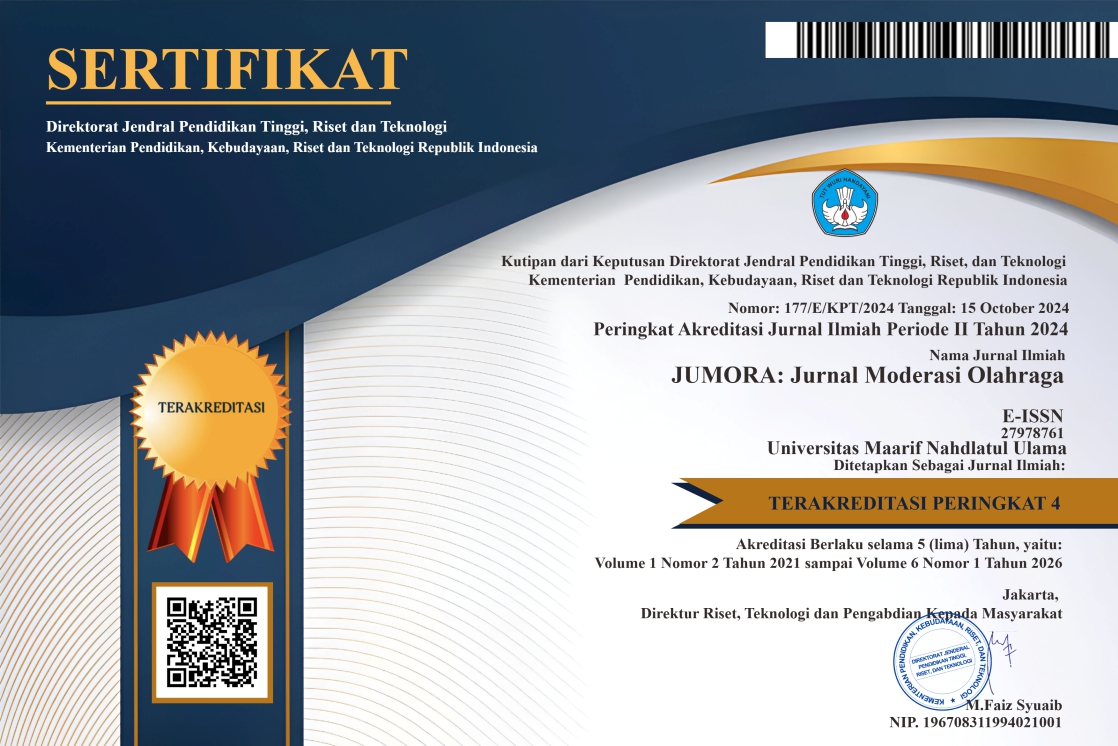Comparison Of Achievement Sport Systems Between Indonesia And China
DOI:
https://doi.org/10.53863/mor.v1i02.213Keywords:
Achievement Sports System, Indonesia, ChinaAbstract
Sport as a model of human creativity is a form of physical activity that has very complex dimensions, which undergo a systematic process in the form of all activities or efforts that can encourage, arouse, develop and foster one's physical and spiritual potential. as individuals or members of society. in the form of games, competitions/contests, and intensive physical activities to obtain recreation, victory, and peak potential. Sport is currently a trend or lifestyle for some of the general public, even to the point of becoming a basic need in life. National development through the development of sports in Indonesia in this reform era has become a strategic vehicle, especially improving the quality of human resources, as well as the formation of the character and character of the nation, in this paper many factors play a role in success in the field of sports, one of which the author wants to examine the differences and similarities between the performance sports system that runs in Indonesia and China. This study aims to compare the development of achievement sports systems carried out in Indonesia and China in order to improve the quality and competence of sports. This study uses a qualitative descriptive method with data collection techniques through documentation studies. The results of this study conclude that the government's contribution is needed in preparing winning strategies, training facilities, increasing competition opportunities and increasing resources that can be assisted by a team of academics and researchers from universities to find new techniques in training to support the maximum use of sport science.
Keywords: achievement sports system, Indonesia, China.
References
Arikunto, S. (2010). Prosedur Penelitian: Suatu Pendekatan Praktik. Jakarta: Rineka Cipta.
Cholik, T. (2002). Gagasan-Gagasan Tentang Pendidikan Jasmani dan Olahraga. Surabaya: Unesa University Press.
Ferdy Irawan, Y., & Limanto, D. (2021). Pengaruh Kecerdasan Emosi dan Kesiapan Diri Terhadap Pertandingan Pada Pemain Walet Muda Futsal Academy Kebumen Tahun 2020. JUMORA: Jurnal Moderasi Olahraga, 1(01), 18-26. https://doi.org/10.53863/mor.v1i01.130
Fitria. (2013). ??No Title No Title. Journal of Chemical Information and Modeling, 53(9), 1689–1699.
Guntur Sutopo, W., & Misno. (2021). Analisis Kecepatan Tendangan Sabit Pada Pesilat Remaja Perguruan Pencak Silat Tri Guna Sakti Di Kabupaten Kebumen Tahun 2020. JUMORA: Jurnal Moderasi Olahraga, 1(01), 27-34. https://doi.org/10.53863/mor.v1i01.131
G,. D., Wu, Y., & Dai. Z. (2015). A Study of The Change in Governent Functions in Elite Sport Development in China, 1949-2012. The International Journal of the History of Sport, 32(10), 1353-1357. https://doi.org/10.1080/09523367.2015.1066993
Ma, G., & Wu, Q. (2020). Cultural capital in migration: Academic achievements of Chinese migrant children in urban public schools. Children and Youth Services Review, 116(18), 105196. https://doi.org/10.1016/j.childyouth.2020.105196
Muchtar, A. T. (2011). Kebangkitan dan Kebijakan Luar Negeri Cina: Antara Persepsi dan Pilihan. Maarif, 6(2), 28–58.
Purba, J. P. (2008). Sistem Pendidikan Jasmani Dan Olahraga.
Ring, C., & Kavussanu, M. (2018). The impact of achievement goals on cheating in sport. Psychology of Sport and Exercise, 35(June 2017), 98–103. https://doi.org/10.1016/j.psychsport.2017.11.016
Shodiq, M., Muttaqien, I. (2003). Dasar- Dasar Penelitian Kualitatif. Yogyakarta: Pustaka Pelajar.
Si, G., Duan, Y., Li, H. Y., Zhang, C. Q., & Su, N. (2015). The influence of the chinese sport system and chinese cultural characteristics on olympic sport psychology services. Psychology of Sport and Exercise, 17, 56–67. https://doi.org/10.1016/j.psychsport.2014.08.008
Wei, F., Hong, F., & Zhouxiang, L. (2010). Chinese state sports policy: Pre- and Post-Beijing 2008. International Journal of the History of Sport, 27(14–15), 2380–2402. https://doi.org/10.1080/09523367.2010.504583
Downloads
Published
How to Cite
Issue
Section
License
Copyright (c) 2021 Muhammad Reza Aziz Prasetya

This work is licensed under a Creative Commons Attribution-ShareAlike 4.0 International License.
Authors retain copyright and grant the journal right of first publication with the work simultaneously licensed under a Creative Commons Attribution-ShareAlike 4.0 International License that allows others to share the work with an acknowledgment of the work’s authorship and initial publication in this journal












